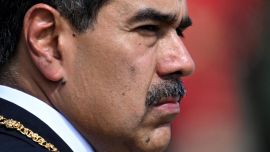Chile's lower house of Congress on Tuesday approved the impeachment trial of President Sebastián Piñera over corruption allegations that appeared in the Pandora Papers leaks.
Lawmakers in the Chamber of Deputies gathered the 78 votes required to seek impeachment and advance proceedings to the Senate over Piñera's involvement in the controversial sale of a mining company.
The call for the impeachment of Piñera – who is in the final stretch of a second non-consecutive term that began in March 2018 – was presented in early October by members of the opposition, including socialist deputy Jaime Naranjo.
Naranjo took 15 hours on the floor on Monday to read from the 1,300-page accusation against the president, arguing that Piñera's "impunity" should end in the South American nation rattled by social unrest that broke out in 2019.
The marathon speech was apparently designed to allow another left-wing lawmaker, Giorgio Jackson, to complete a period of quarantine and join the process before it ended so he could vote.
"What we saw was a show," said Juan José Ossa, the minister general-secretary of the presidency, an equivalent to the chief-of-staff.
The case grew as new details emerged about a deal first revealed in the Pandora Papers document leak, which highlighted offshore transactions involving political figures.
Naranjo highlighted potential corruption around the 2010 sale of the huge Dominga mine in Chile when Piñera, a wealthy businessman, was a first-term president.
The Pandora Papers linked Piñera to the sale of Dominga, through a company owned by his children, to businessman Carlos Delano – a close friend of the president – for US$152 million.
The papers said a large part of the operation was carried out in the British Virgin Islands, a tax haven.
"Acting as president, he benefited (himself) and his family in a direct way, with information that he had in the exercise of his office," said Naranjo, adding that Piñera's involvement pushed up the sale price.
Piñera's lawyer Jorge Galvez brought the embattled president's defense to a close before the chamber, saying: "I beg you, honourable deputies, to reject this improper constitutional accusation."
The case now moves to the Senate, where the effort to remove Piñera from office does not appear to have the necessary votes.
However, the president is barred from leaving the country while the process continues.
If found guilty, Piñera could be jailed for up to five years.
Controversial clause
Piñera, one of the richest men in Chile, has denied the claims and said that he was absolved of the charges in a 2017 investigation.
It is the second impeachment case brought against the conservative leader after an unsuccessful attempt to remove him from office in 2019 over the at-times brutal crackdown on anti-inequality protesters.
The Pandora Papers said a controversial clause was included in the Dominga deal that made the final payment of the sale conditional on "not establishing an area of environmental protection in the area of operations of the mining company, as demanded by environmental groups."
According to the investigation, the Piñera government at the time decided not to protect the area around the mine.
Galvez denied the president "intervened in the decision to sell" the mine, nor that the decision not to protect the area was linked to the sale.
Dominga owns two open-air mines in the Atacama desert, 500 kilometres (310 miles) north of Santiago, that are yet to be exploited.
A mining project to do so was approved by a regional court but has yet to be ratified in the Supreme Court due to appeals.
The project included the construction of a cargo port close to an archipelago that is home to a national park reserve where protected species live, including 80 percent of the world's population of Humboldt penguins.
related news
by Paula Bustamante, AFP

























Comments